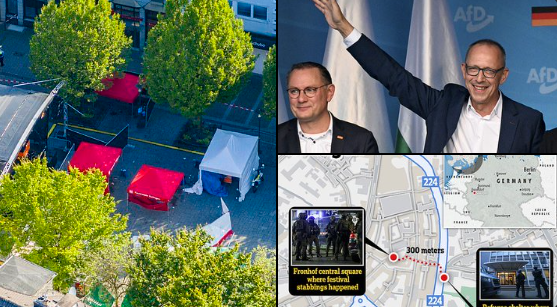In the ongoing German elections, significant shifts are occurring. The center-right Christian Democrats (CDU/CSU) are leading with 30.2% of the vote, while the far-right Alternative for Germany (AfD) is making substantial gains, reaching 16%, a notable increase from previous elections. This surge reflects growing concerns about immigration and economic issues. Chancellor Olaf Scholz’s Social Democrats (SPD) are struggling, having received less than 14% of the vote, which marks a historic low for the party. The results could threaten the stability of Scholz’s coalition government due to internal conflicts and declining public support POLITICO
The Alternative for Germany (AfD) party, known for its far-right stance, is poised to make significant gains in the upcoming state elections in eastern Germany. The AfD, which has faced criticism for its leaders’ positive remarks about Nazis, is leading in several polls and is expected to capture approximately 30% of the votes this Sunday. This surge in support is evident in regions such as Saxony and Thuringia, where there is widespread dissatisfaction with the current Social Democratic Party of Germany.
Germany’s very right-wing #AfD party is set for huge gains in key state elections amid mounting fury over the festival stabbing rampage by a failed Syrian asylum seeker.
Voters in Thuringia & Saxony will go to the polls on Sunday in what could be a superb night for the… pic.twitter.com/aOwv3NPt51
— Mr Pål Christiansen (@TheNorskaPaul) August 31, 2024
Voters’ concerns in these areas are diverse, focusing on issues like the economic impacts of Russia’s war with Ukraine, sluggish economic growth, the shift towards green energy, and immigration policies intensified by a recent terror attack. The AfD has capitalized on these issues, particularly the debate on immigration, following a deadly knife attack at a music festival, which their national leader, Alice Weidel, attributes to the Christian Democratic Union’s lax immigration policies.
The far right is on the cusp of winning the most votes in German state elections for the first time since the Nazis.
For some in Germany, the rise of Alternative for Germany (AfD) is a literal nightmare.
But others, particularly in the east, say the AfD is a chance for change.… pic.twitter.com/WTbBZnS4dy— Queen Natalie (@TheNorfolkLion) August 31, 2024
The party’s campaign includes provocative elements like a poster in Thuringia featuring the slogan “summer, sun, remigration,” suggesting a hardline stance on immigration. Furthermore, the AfD’s rejection of climate change science and support for Russia in its conflict with Ukraine are central to their platform, with campaign imagery merging German and Russian flags under the message “Peace is Everything!”
The AfD’s controversial positions extend to its leadership, with several leaders facing penalties for apparent endorsements of Nazi ideologies. Notably, Maximilian Krah withdrew from campaigning after his comments about the Nazi SS, and Björn Höcke was fined for using a Nazi-era slogan during party events.
Germany’s far-right AfD party making notable strides in regional elections
• Expected to secure first place in Thuringia
• Running a tight race with the CDU in Saxony, with a narrow lead https://t.co/B44Ykspj6R pic.twitter.com/gjfsVVKtVi
— Anadolu English (@anadoluagency) August 30, 2024
Despite the AfD’s momentum, leftist groups and other political parties are striving to counter its influence as the election approaches. Chancellor Olaf Scholz of the Social Democratic Party cited the overshadowing effect of the Russian-Ukraine war on his government’s achievements as a contributing factor to the declining public support for his party.
Major Points:
- The Alternative for Germany (AfD), a far-right political party, is leading in polls and expected to secure around 30% of the vote in upcoming state elections in Saxony and Thuringia.
- Voter dissatisfaction in these regions centers on issues such as the economic impact of the Ukraine war, slow economic growth, green energy transitions, and immigration debates intensified by recent terror attacks.
- AfD’s campaign has capitalized on anti-immigration sentiment, with provocative ads and a platform that denies climate change while supporting Russia in its conflict with Ukraine.
- Several AfD leaders have faced repercussions for endorsing Nazi ideologies, including top candidate Maximilian Krah, who withdrew after controversial remarks about the Nazi SS.
- Leftist groups and other political parties are struggling to counter AfD’s rising influence, with Chancellor Olaf Scholz attributing waning support for his party to the ongoing Russian-Ukraine conflict.
Al Santana – Reprinted with permission of Whatfinger News



